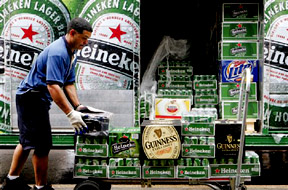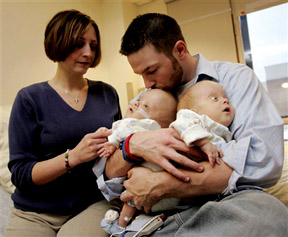|
observer |
|
|
|
|
|
OTHER LINKS |

|

|

|
HealthChildren of alcoholics bear mental scars
Children who grow up with alcoholic parents bear emotional, behavioral and mental scars, experts say. The Priory study said children of alcoholics were four times more likely to be addicted to drink and there was a risk of drug and gambling problems. The private health provider said a child's early life was characterised by chaos, trauma, confusion and shame and, quite often, sexual and physical abuse. The report found 55% of domestic violence occurs in alcoholic homes. The Priory reviewed existing data on crime, abuse and alcoholism as well as consulting its own doctors and therapists to compile the report. It said the problems children of alcoholics experience in early life had a profound impact later in life. The report said growing up in an alcoholic household was inextricably linked to abuse. Some 55% of family violence occurs in alcoholic homes with alcohol a factor in 90% of child abuse cases. Studies have also showed a third of daughters of alcoholics experienced physical abuse and a fifth sexual abuse - up to four times higher than in non-alcoholic homes, the Priory said. The report said children reacted in one of three ways - either they became withdrawn, went into denial or used the experience to benefit themselves by becoming stronger.Many of the children of alcoholics, even those who would perhaps have been withdrawn, could grow up to be likeable, kind and intuitive. DifficultiesBut the problems surfaced when they had to confront difficulties. The report said: "Their feelings about themselves are the opposite of the serene image they present - they generally feel insecure, inadequate, dull, unsuccessful, vulnerable and anxious". They also struggled to develop strong personal relationships. Researchers said previous studies had revealed that 70% of children of alcoholics develop compulsive behaviour around either alcohol, drugs, food, sex, work or gambling, while a half ended up marrying alcoholics. And they said children of alcoholics were four times more likely to become alcoholics - partly because of genetics - than the one in 20 of the general population that have the condition currently. Priory addictions expert Dr. Michael Bristow said: "There is a widespread misconception that addiction is all about the addict, that it is solely the addict who suffer from his illness. (BBC News)Doctors aim to make global births saferThey hope the manual will enable safer births. About 60m mothers in the developing world give birth at home every year without a skilled person to help.
The manual has been produced by the Liverpool School of Tropical Medicine (LSTM) with the Liverpool Associates in Tropical Health and the Royal College of Obstetrics and Gynaecology (RCOG).They hope the simplicity of the guide will ensure it can be used by everyone. This is particularly important in some of the most rural areas, where one midwife could be struggling to cope with a variety of complicated pregnancies alone. In addition, the partnership hopes to raise awareness about clinical standards and to encourage RCOG members to volunteer their expertise to developing countries. They hope this will help improve the quality of antenatal delivery and postnatal services. The organisations are already involved in a variety of safe motherhood programmes including in Nigeria, Kenya and Malawi, countries with some of the highest maternal mortality rates in the world. Health workers are also trained in reproductive medicine. Dr. Nynke van den Broek, senior clinical lecturer in reproductive health at the LSTM, said she hoped that by pooling resources they could cut maternal mortality. "I was in Northern Nigeria recently and I saw a woman lying in a bed with pre-eclampsia. "She and the baby did survive, but the doctors took some time to get the drugs she needed to treat her. If the doctors had been on the course and had the manual they would have known how to treat her sooner." She said the women needed to know they would get the best possible care. "More than 80% of these deaths are caused by conditions which we are very able to prevent or treat -bleeding, obstructed labour, eclampsia, infection and unsafe abortions. "We hope our alliance will help to mobilise efforts so that we can make a dent in these horrific figures. "The issue of women's health comes on and off the global agenda. (BBC News)Pollutants reduce: vaccine effectivenessA new report says exposure to pollutants may reduce a child's immune response to vaccinations. Dr. Philippe Grandjean from the University of Southern Denmark tells Reuters Health, "Pollutants, such as PCBs (polychlorinated biphenyls), may be partially responsible that vaccinations don't 'take' in some children." "I believe that this is yet another reason to protect children and pregnant women against chemical pollutants." Grandjean and colleagues studied vaccination responses in two birth cohorts from the Faroe Islands. Exposure to PCBs, chemicals commonly used in industry, are 10 times higher in the Faroe Islands than in Northern Europe. Grandjean says this is "because traditional diets may include whale blubber contaminated with PCBs." The scientists determined PCB exposure by analyzing a pregnant woman's blood, and her early or "transition" milk, as well as children's blood samples. The 119 children who got diphtheria and tetanus vaccines were examined at 18 months. Among 119 children who got diphtheria and tetanus vaccines, there was a strong correlation between prenatal PCB exposure and antibody concentrations. The scientists found the greater the PCB exposure, the lower the antibody protection. (All Headline News) |

 More than half a million women die each year through
pregnancy-related conditions, because they do not have access to the
most basic care. In an effort to make pregnancy and giving birth safer,
three leading medical organisations have teamed up to produce a
practical birth manual to be used by health workers in the developing
world.
More than half a million women die each year through
pregnancy-related conditions, because they do not have access to the
most basic care. In an effort to make pregnancy and giving birth safer,
three leading medical organisations have teamed up to produce a
practical birth manual to be used by health workers in the developing
world. 







